Where are you from, Debbie, and what are you doing nowadays?
I was born and brought up in New Zealand but I left here at the age of 21 and did not return until 2010.
Why did you choose to move back to New Zealand?
My British husband and I decided that we would retire here and bought a property preparatory to moving here full time which we did in 2014. In that, I am fairly typical of Kiwis, many of whom go abroad when young, but most of who return eventually. Indeed, my best friends here are Kiwis whom I met when we were all expatriates in the Middle-East.
What were the procedures you had to follow to move there?
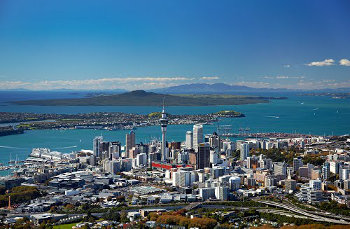
Insofar as settling back here has been difficult, I will share my husband's experience with you. One should not lightly undertake to emigrate it seems. As the husband for 32 years of a New Zealand national and with two children who are also NZ citizens, he thought he would walk in. Not so.
The process by which he can become a resident is a long, difficult and expensive one. The main problem is paperwork. Nothing is done on trust or face value anymore and reams of paperwork are necessary. All certificates such as university degrees etc., must be validated by their issuing body and the biggest issue has been police clearance dating back ten years. Unfortunately when one has worked in countries that don't deal with official police clearance, getting this kind of clearance can be a complete nightmare. (We know people who worked in an African country who ended up making their own police clearance document as there was no official one available!)
In our case, some certification had been misplaced (not surprising when one is moving around the world) and it had to be reapplied for. This has taken literally months, almost a year in one case. New Zealand Immigration have also insisted on police clearance for me as well (although I am by birth a NZ citizen). This is because they maintain that, as a sponsor of my husband, I must be a suitably honest person!
The fact that I am a qualified secondary teacher, with fifteen years' experience in international schools, impacts them not at all. They are impervious to the argument that, in the Middle-East, if you do anything to break the laws of the country, you are immediately deported. Without proper police clearance we could not have moved from one Middle-Eastern country to another. Without proper police clearance, I would not have been cleared to work in schools. But it means nothing to NZ Immigration. They want paperwork with as many stamps and seals as possible!
What are the local labor market's features? Is it easy for expatriates to be hired there?
So there is my husband, a British-qualified architect who has headed up iconic projects across the Middle-East, finally, reluctantly, issued a working visa for NZ until the arrival of the police certificates guarantees residency. He has UK police clearance but, because we have not lived there permanently since 1999, this is irrelevant. He cannot work in New Zealand because, although immensely qualified, he has no knowledge of NZ building codes. There are not many billion dollar projects here either and he has had little residential experience.
As for me, I am not registered as a teacher in NZ, so I can't teach here. Legally I probably shouldn't be home tutoring students. Without a teaching certificate and police clearance I can't even go onto a campus. I can apply for teacher registration here, but my degrees from British universities will have to be validated by those same universities, which means more reams of paperwork and hundreds of dollars to be paid. I simply can't be bothered.
I do work online for the International Baccalaureate but NZ students do not get the benefit of my years of experience. Other, younger teacher friends have undergone the same process and are now teaching here but every year it gets a little bit more difficult. In addition, I have no experience of the New Zealand NCEA syllabus as it has changed significantly since the time I was educated here in the 60's and 70's.
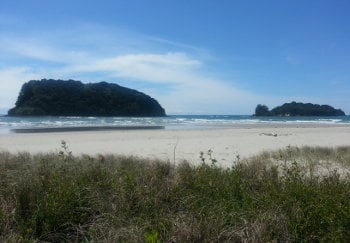
What is your opinion on the cost of living in New Zealand?
Living here is a joy, although it is an expensive one. Compared to the average NZ income which is low, the cost of housing here is one of the highest in the world. This has been blamed on the large influx of investors from Southeast Asia who are able to buy property as non-residents and consequently the prices in Auckland have gone crazy. This is very different in Australia where non-residents cannot buy property and it is something which is causing a lot of anxiety in native-born New Zealanders who are being priced out of the market in their own country. But the economy is buzzing here; there is a vibrant tourist economy.
Is it easy for an expat to live there?
In Auckland the cafes are full, people dine out regularly at wonderful restaurants, and there is a breadth of culture which is world class-and well patronized. It is a very different country from the one I left in 1980. Auckland is now an international city and the prices reflect that. The NZ dollar has become weak over the last year going down about 20% against other currencies, although it was very strong for a long time. People do complain, however, that this has become a country of extremes of rich and poor and it is true. Poverty exists here now where it never did before. The "God's own country" of my childhood has largely vanished.
What does your every day life look like in New Zealand?
We travel round the country, and are constantly astonished at its natural beauty and the lack of people. I do voluntary work with animal welfare groups and dog training, and am busy with my writing, my garden and amateur theatricals as well as my online educational work.
How do you spend your leisure time?
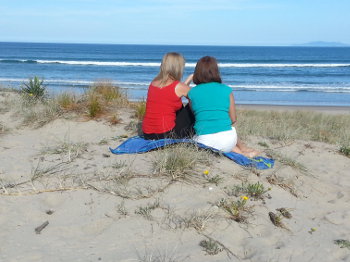
It is not necessary to spend money to have a good time. The weather is usually good and the winters mild. We go cycling or walking frequently in the wonderful regional parks, stay at friends' beach houses. We belong to tennis clubs and gyms and my husband plays bridge and golf.
Have you been able to adapt yourself to the country and to its society?
It has not been easy developing a friendship base because it is not like the Middle-East where everyone was an expat and friendships were quickly established. Here one has to first make acquaintances and it takes time.
How do you find the Kiwi lifestyle?
People are very friendly. We have a small base of family here and some good friends. For me it has been a homecoming but not so for my husband. He has had times of feeling very isolated and frustrated by the small-scale of the lifestyle and the parochial attitudes of some people.
What about the expats living there?
I do occasionally come across young British migrants living and working here and, in 9 cases out of 10, they love it. They love the weather, the openness of the country and the people, the outdoor lifestyle. They all rate it as an excellent place to raise children. My own daughter intends to come back here from Hong Kong in 18 months with her French husband. He has already begun on the mountain of paperwork he needs to apply to become a resident in New Zealand.
What has motivated you to write your novel "Expat"? How far does it reflect upon your own expat experience?
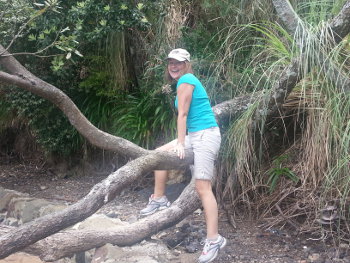
I started writing the novel "Expat" when I was living in Qatar in 2012, basing it on my experiences of life in the Middle-East. I had always been fascinated by how becoming an expat changed people: they often became far less liberal and often racist. They began to see themselves as much more important than they really were as the status of the (British, particularly white) expat is often high in these countries. They have high salaries, big cars, large houses and servants and it goes to their heads. Men, in particular, lose a sense of perspective. Their wives owe them their living, literally. In Qatar, I had to have my husband's written permission to have a job, to drive a car, to open a bank account and have a credit card and the list goes on. No wonder people lose a sense of reality. I set the novel in Dubai, which is the most complex and fractured of the Middle-Eastern societies I encountered.
Would you like to give any advice to soon-to-be expatriates in New Zealand?
To anyone contemplating working abroad I would say do it. It's a wonderful experience but it is life-changing. Don't underestimate the effect it will have on you. As far as emigration goes, my advice is think carefully. The grass may always seem to be greener on the other side of the fence but the reality is often very different. I have been fortunate in that I always had my home country to return to but it has been a shock to find that it has not welcomed me back as I had imagined it would. Every day is a fresh challenge, but I would not have it any other way.
What are your plans for the future?
We are building our own house, a perfect project for an architect, although he has had to employ other architects to get through planning and building consent. Still, we have an acre of garden in a beautiful part of Auckland, about 25 minutes from the city, and we will, eventually, have the "dream house".



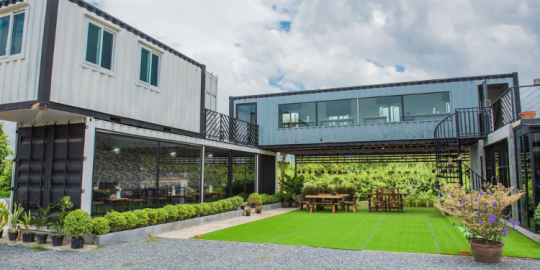

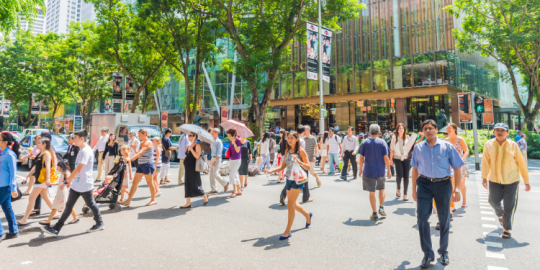











Contact us to be featured in the Interviews section.
Participate